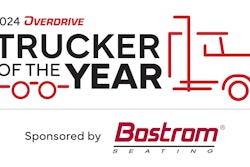Randy Grider
Editor
[email protected]
This year is considered a milestone in trucking. The American Trucking Associations is leading the charge by celebrating the 100th anniversary of the trucking industry, validating the date by citing the U.S. Postal Service’s 1953 issuance of a commemorative stamp to honor the golden anniversary of the industry.
When 2003 draws to a close, it also will be touted as an important year for major changes that will affect trucking well into the 21st century. Several evolving issues will be big newsmakers this year.
One that has quickly leapt back into the spotlight is the controversial opening of the U.S. border to Mexican trucks to satisfy this country’s commitment to the North American Free Trade Agreement. President Bush recently modified the moratorium on granting operating authority to Mexican trucking operations. The move was supposed to allow federal offices to act on pending applications from approximately 130 Mexican-based truck and bus companies. But a coalition, which includes labor, trucking and environmental groups, filed an emergency injunction to block Bush’s action.
The coalition claims the president acted improperly because an injunction, which was filed in May 2002 against the Bush administration on allegations that officials had failed to comply with the National Environmental Policy and Clean Air Act regulations while working toward an open Mexican-U.S. border, has yet to be settled.
Despite the political and legal wrangling, opening the U.S.-Mexican border, which is supported by the ATA, looks to be finally moving closer to reality. Still, don’t look for a flood of foreign truckers moving freight beyond the commercial border zones in either country right away. If U.S. safety regulations are enforced, as they should be, it will be, at best, a gradual process.
While NAFTA won’t necessarily affect all drivers personally, another controversial issue coming to a head will. According to published reports last month, Secretary of Transportation Norman Mineta said Joseph Clapp, the outgoing administrator of the Federal Motor Carrier Safety Administration, would complete a revised hours-of-service plan for commercial drivers before leaving office.
While we know that not everyone will be happy with any proposal concerning hours of service, we hope any new plan will be more realistic than the last attempt at reform that federal officials made in late 2000.
That one-size-fits-all proposal was shelved after those officials received thousands of public comments from people in the trucking industry who complained that there was no way the plan would work in the real world. Aside from being too cumbersome, it would have had a disastrous financial effect on truckers and the trucking industry as a whole. It also would have been virtually impossible to enforce, and drivers faced the very real possibility of being forced to shut down miles from home to satisfy a mandatory “weekend” provision. Onboard data recording devices, or “black boxes,” also caused quite a stir among drivers.
FMCSA’s second attempt at hours-of-service reform should bring plenty of attention back to the systematic problems drivers face trying to make a living. Many drivers will readily tell you that the only true reform is to do away with archaic mileage system and give them decent hourly wages. It’ll be interesting to see what the feds have come up with this time.
Another issue this year will be whether the trucking industry warms up to the new lower-emissions engines. While a few fleets have taken a chance on the EPA-certified power units using exhaust gas recirculation technology, most are taking a wait-and-see attitude. Hopefully, the concerns over maintenance costs, fuel economy and dependability will not turn out to be a stumbling block in the economic turnaround of the trucking industry.
If the engines prove to be cost-effective and reliable, the truck buyers will take notice.
Unless environmental regulations that spurred the lower-emissions engines are repealed, emissions-friendly power units are here for the long haul.
Like it or not, 2003 is set up to be a pivotal year in trucking. Hopefully, the road ahead will be smooth enough to keep all the truckers who love their jobs in the driver’s seat.






